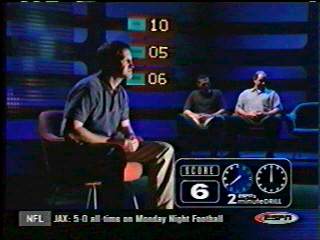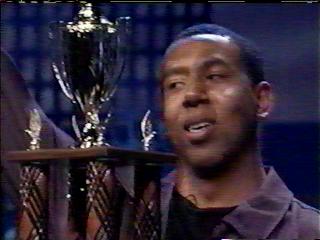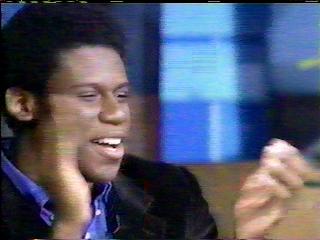

 Host: Kenny Mayne
Host: Kenny Mayne
Aired: 9/00-12/00, Monday and Thursday nights;
6/01-9/01, Tuesday nights;
9/01-12/01, Tues-Thu late nights, ESPN
(Reruns frequently aired on ESPN2 and ESPN Classic at various times)
Producers: Diplomatic Productions
ESPN's 2-Minute Drill is the brainchild of Michael
Davies, the man who brought Who Wants to be a Millionaire to the U.S. In each
episode, Host Mayne (a favorite from ESPN's flagship "SportsCenter")
led a panel of four guest questioners -- a mix of professional
athletes, sports journalists and broadcasters, and actors. Frequent
guests have included fellow "SportsCenter" anchor Rich Eisen, actor
Robert Wuhl ("Arli$$"), the Knicks' Marcus Camby, and ESPN radio's morning show hosts, Mike Golic and Mike Greenberg. Even Regis Philbin got into the act in the first season's championship game. Three tournaments were played over an 18-month period. While the show hasn't been officially cancelled, no new episodes are scheduled to be produced. Here's hoping ESPN will be convinced to greenlight a fourth tournament this summer.
The first season featured different rules than the last two.  Three contestants compete in Round one, and each faces a "two-minute
drill" of questions from the four guests, who each represent a different
category. (Categories change from player to player.) The contestant
called for the questioner of his choice each time, with the only
exception being that a different panelist must be chosen if a
wrong answer is given. Each correct answer earns one point; also,
upon the completion of the drill, a bonus point is awarded for each
five-question category swept by the player.
Three contestants compete in Round one, and each faces a "two-minute
drill" of questions from the four guests, who each represent a different
category. (Categories change from player to player.) The contestant
called for the questioner of his choice each time, with the only
exception being that a different panelist must be chosen if a
wrong answer is given. Each correct answer earns one point; also,
upon the completion of the drill, a bonus point is awarded for each
five-question category swept by the player.
 The two highest-scoring players moved on to Round 2, where each faced
another Drill. This time, Mayne joined the panelists in asking the
questions, which were not limited to any specific categories. Also in
this round, the contestant did not choose who asked the next question.
The contestant with the highest score after this round was the day's
winner, earning $5,000 and an "ESPN Experience" - usually trips to
big sporting events combined with ESPN behind-the-scenes access,
although trips to fantasy camps and appearances on the popular
ESPN promos were also up for grabs.
The two highest-scoring players moved on to Round 2, where each faced
another Drill. This time, Mayne joined the panelists in asking the
questions, which were not limited to any specific categories. Also in
this round, the contestant did not choose who asked the next question.
The contestant with the highest score after this round was the day's
winner, earning $5,000 and an "ESPN Experience" - usually trips to
big sporting events combined with ESPN behind-the-scenes access,
although trips to fantasy camps and appearances on the popular
ESPN promos were also up for grabs.
 The winner then faced Mayne for one final, multi-part question from
the player's pre-chosen category of expertise (usually a specific
sports team of the past or single athlete). A correct answer doubled
the player's cash total to $10,000. Regardless of this outcome, the
player also advances in the season tournament. 17 first-round winners
and the highest-scoring non-winner moved on to round 2, where the cash
prize was $15,000 with a possible $30,000. The six winners moved to
a $30,000 semi-final (again with a chance to double the prize), and
the two winners (along with a wild-card) played the grand final - aired on Christmas Day 2000 - which offered a $50,000
guarantee and a possible $100,000. Therefore, the year's
champion could've theoretically won $200,000 in cash and four ESPN experiences.
The winner then faced Mayne for one final, multi-part question from
the player's pre-chosen category of expertise (usually a specific
sports team of the past or single athlete). A correct answer doubled
the player's cash total to $10,000. Regardless of this outcome, the
player also advances in the season tournament. 17 first-round winners
and the highest-scoring non-winner moved on to round 2, where the cash
prize was $15,000 with a possible $30,000. The six winners moved to
a $30,000 semi-final (again with a chance to double the prize), and
the two winners (along with a wild-card) played the grand final - aired on Christmas Day 2000 - which offered a $50,000
guarantee and a possible $100,000. Therefore, the year's
champion could've theoretically won $200,000 in cash and four ESPN experiences.
 Willy Gibson of Columbus, OH defeated top-seed Larry Glickstein (whom Gibson also defeated in the semifinal) and Jim Jividen to take the inaugural championship. Gibson left with $115,000 in cash after missing his final question on Deion Sanders. Gibson also won trips to the 2001 Super Bowl and ESPY awards.
Willy Gibson of Columbus, OH defeated top-seed Larry Glickstein (whom Gibson also defeated in the semifinal) and Jim Jividen to take the inaugural championship. Gibson left with $115,000 in cash after missing his final question on Deion Sanders. Gibson also won trips to the 2001 Super Bowl and ESPY awards.
A number of changes were made for the second season; only two contestants competed per episode (no Wild Cards advanced; it was win-and-in, lose-and-go-home). In Round 1, the contestant was required to answer all four questions from a panelist before selecting another. With bonus points, the top possible Round 1 score was 20. Round 2 played as before, except that Kenny no longer asks questions. Also, in both rounds, contestants were required to listen to the entire question before answering -- a rule designed to allow viewers to play along; sadly, it detracted a bit from the game.
Also, the bonus question was been given a name: "The Question of Great Signifigance." (Kenny made that up, I'll bet.) Prizes for each round were $5,000, $10,000, $15,000, $30,000 and $50,000, with ESPN Experiences given only in Rounds Two and beyond.
 The rules didn't change Will Gibson's dominance, as he plowed through the field in the second tournament to repeat as champion, defeating Missourian Vinod Velakaturi 30-28 in the championship game. Gibson's $110,000 take for the second tournament pushed his cash total to $225,000.
The rules didn't change Will Gibson's dominance, as he plowed through the field in the second tournament to repeat as champion, defeating Missourian Vinod Velakaturi 30-28 in the championship game. Gibson's $110,000 take for the second tournament pushed his cash total to $225,000.
 Gibson returned for Season #3 and won his first-round match before finally being defeated in a tiebreaker by Michael Lazarus. Lazarus moved onto the grand final, where he faced Adesina Koiki, an 18-year-old Syracuse sophomore rom Brooklyn. Koiki had absolutely mowed down the field on his way to the final, and dispatched Lazarus 26-22 to become the series' final (it seems) champion on Christmas Eve 2001. Koiki racked up $170,000 in cash, by virtue of his correctly nailing four of five Questions of Great Signifigance.
Gibson returned for Season #3 and won his first-round match before finally being defeated in a tiebreaker by Michael Lazarus. Lazarus moved onto the grand final, where he faced Adesina Koiki, an 18-year-old Syracuse sophomore rom Brooklyn. Koiki had absolutely mowed down the field on his way to the final, and dispatched Lazarus 26-22 to become the series' final (it seems) champion on Christmas Eve 2001. Koiki racked up $170,000 in cash, by virtue of his correctly nailing four of five Questions of Great Signifigance.
Gibson left the show with $230,000 in cash, to go with nine ESPN Experiences, making him cable TV's second-biggest winner all-time.
If you're reading this, ESPN, let's have another tournament!
Back to the Sports Game Show Page!
 Three contestants compete in Round one, and each faces a "two-minute
drill" of questions from the four guests, who each represent a different
category. (Categories change from player to player.) The contestant
called for the questioner of his choice each time, with the only
exception being that a different panelist must be chosen if a
wrong answer is given. Each correct answer earns one point; also,
upon the completion of the drill, a bonus point is awarded for each
five-question category swept by the player.
Three contestants compete in Round one, and each faces a "two-minute
drill" of questions from the four guests, who each represent a different
category. (Categories change from player to player.) The contestant
called for the questioner of his choice each time, with the only
exception being that a different panelist must be chosen if a
wrong answer is given. Each correct answer earns one point; also,
upon the completion of the drill, a bonus point is awarded for each
five-question category swept by the player.


 Host: Kenny Mayne
Host: Kenny Mayne The two highest-scoring players moved on to Round 2, where each faced
another Drill. This time, Mayne joined the panelists in asking the
questions, which were not limited to any specific categories. Also in
this round, the contestant did not choose who asked the next question.
The contestant with the highest score after this round was the day's
winner, earning $5,000 and an "ESPN Experience" - usually trips to
big sporting events combined with ESPN behind-the-scenes access,
although trips to fantasy camps and appearances on the popular
ESPN promos were also up for grabs.
The two highest-scoring players moved on to Round 2, where each faced
another Drill. This time, Mayne joined the panelists in asking the
questions, which were not limited to any specific categories. Also in
this round, the contestant did not choose who asked the next question.
The contestant with the highest score after this round was the day's
winner, earning $5,000 and an "ESPN Experience" - usually trips to
big sporting events combined with ESPN behind-the-scenes access,
although trips to fantasy camps and appearances on the popular
ESPN promos were also up for grabs.
 The winner then faced Mayne for one final, multi-part question from
the player's pre-chosen category of expertise (usually a specific
sports team of the past or single athlete). A correct answer doubled
the player's cash total to $10,000. Regardless of this outcome, the
player also advances in the season tournament. 17 first-round winners
and the highest-scoring non-winner moved on to round 2, where the cash
prize was $15,000 with a possible $30,000. The six winners moved to
a $30,000 semi-final (again with a chance to double the prize), and
the two winners (along with a wild-card) played the grand final - aired on Christmas Day 2000 - which offered a $50,000
guarantee and a possible $100,000. Therefore, the year's
champion could've theoretically won $200,000 in cash and four ESPN experiences.
The winner then faced Mayne for one final, multi-part question from
the player's pre-chosen category of expertise (usually a specific
sports team of the past or single athlete). A correct answer doubled
the player's cash total to $10,000. Regardless of this outcome, the
player also advances in the season tournament. 17 first-round winners
and the highest-scoring non-winner moved on to round 2, where the cash
prize was $15,000 with a possible $30,000. The six winners moved to
a $30,000 semi-final (again with a chance to double the prize), and
the two winners (along with a wild-card) played the grand final - aired on Christmas Day 2000 - which offered a $50,000
guarantee and a possible $100,000. Therefore, the year's
champion could've theoretically won $200,000 in cash and four ESPN experiences.
 Willy Gibson of Columbus, OH defeated top-seed Larry Glickstein (whom Gibson also defeated in the semifinal) and Jim Jividen to take the inaugural championship. Gibson left with $115,000 in cash after missing his final question on Deion Sanders. Gibson also won trips to the 2001 Super Bowl and ESPY awards.
Willy Gibson of Columbus, OH defeated top-seed Larry Glickstein (whom Gibson also defeated in the semifinal) and Jim Jividen to take the inaugural championship. Gibson left with $115,000 in cash after missing his final question on Deion Sanders. Gibson also won trips to the 2001 Super Bowl and ESPY awards.
 The rules didn't change Will Gibson's dominance, as he plowed through the field in the second tournament to repeat as champion, defeating Missourian Vinod Velakaturi 30-28 in the championship game. Gibson's $110,000 take for the second tournament pushed his cash total to $225,000.
The rules didn't change Will Gibson's dominance, as he plowed through the field in the second tournament to repeat as champion, defeating Missourian Vinod Velakaturi 30-28 in the championship game. Gibson's $110,000 take for the second tournament pushed his cash total to $225,000.
 Gibson returned for Season #3 and won his first-round match before finally being defeated in a tiebreaker by Michael Lazarus. Lazarus moved onto the grand final, where he faced Adesina Koiki, an 18-year-old Syracuse sophomore rom Brooklyn. Koiki had absolutely mowed down the field on his way to the final, and dispatched Lazarus 26-22 to become the series' final (it seems) champion on Christmas Eve 2001. Koiki racked up $170,000 in cash, by virtue of his correctly nailing four of five Questions of Great Signifigance.
Gibson returned for Season #3 and won his first-round match before finally being defeated in a tiebreaker by Michael Lazarus. Lazarus moved onto the grand final, where he faced Adesina Koiki, an 18-year-old Syracuse sophomore rom Brooklyn. Koiki had absolutely mowed down the field on his way to the final, and dispatched Lazarus 26-22 to become the series' final (it seems) champion on Christmas Eve 2001. Koiki racked up $170,000 in cash, by virtue of his correctly nailing four of five Questions of Great Signifigance.